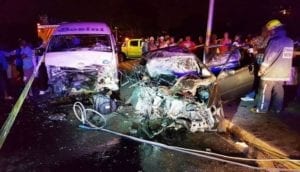As part of ongoing efforts to support nationwide road safety activities, a road user behaviour colloquium has been convened in Pretoria.
The colloquium, hosted by the Department of Transport and the South African National Roads Agency SOC Limited (SANRAL), in partnership with the University of Pretoria, is a platform for stakeholders to engage with key experts in the field of road safety behavioural research. Those participating include industry experts, policy makers and school pupils from across Pretoria. The learners were invited to join the discussion and offer their insights as pedestrians, passengers and public transport users. Speaking at the opening of the colloquium, Transport Minister Dipou Peters said the colloquium was held to find solutions to make roads safer and combat the scourge of accidents. Accidents, the Minister said, rob communities of people who are at the prime of their lives, affecting productivity and placing significant burdens on the State and organisations who have to care for people who are victims of road crashes. “Every person who dies on our roads belongs to a family; someone’s child, husband or wife; somebody’s friend or colleague; a breadwinner, a talented sportsman or musician, a teacher, an activist, a member of a club or a congregation, a child whose place in the classroom is now empty,” said Minister Peters. South Africa has a road death toll of 23.5 per 100 000 of the population, way above the global average. It is for this reason that the Minister said road safety education needs to start at an early age.She said it was high time South Africans think about solutions from a fresh perspective to educate youth on road safety.
“Formal education and training will remain important but we must also broaden our minds and find ways to include road safety messages into the wider curriculum, into mathematics and science, geography and civic education,” she said. She said social media must be used optimally to promote road safety. She commended SANRAL for its commitment to the “safe systems” approach endorsed in the United Nations’ Decade for Action on Road Safety. “SANRAL has taken the lead to create safer road environments and make an impact on human behaviour. Safe systems are designed with the human being at its centre. It takes human fallibilities and vulnerabilities into account. It accepts that even the most safety conscious person will make a mistake at some point. “Through safe systems, human errors can be minimised that will lead to less severe crashes,” Minister Peters said. However, she stressed that the provision of safe infrastructure cannot be separated from the need to provide road users with sufficient information and road safety training that will result in changed behaviour. – SAnews.gov.za






